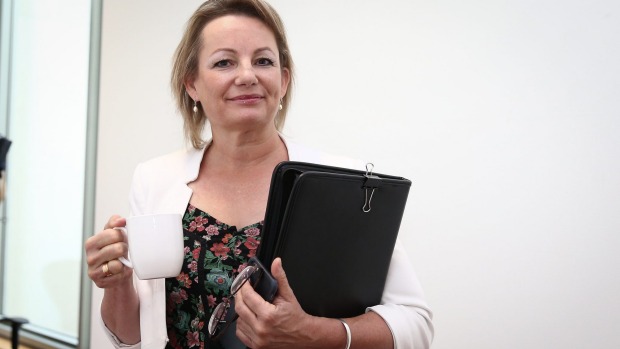
Health Minister Sussan Ley said the location rules and other pharmacy regulation and remuneration arrangements would be reviewed over the next two years. Photo: Alex Ellinghausen
Rules that restrict new pharmacies from opening near existing pharmacies will be extended for another five years despite numerous government-commissioned reviews recommending they be abolished.
Health Minister Sussan Ley announced on Monday that the rules would be extended until July 2020 as part of an $18.9 billion agreement with the Pharmacy Guild of Australia, which will also allow pharmacists to discount the fee patients pay for prescription drugs by $1 a script from next month.
Ms Ley said the agreement would deliver “cheaper, more affordable medicines for
consumers”.

The new deal will also allow pharmacists to discount the fee patients pay for prescription drugs by $1 a script from next month. Photo: Virginia Star
“It will particularly benefit concession card holders, who make up 80 per cent of scripts purchased through the Pharmaceutical Benefits Scheme,” she said.
It will be up to pharmacists to decide whether to offer the $1 discount, and pharmacists that do offer the discount will absorb the cost. Ms Ley has admitted pharmacists in country areas may be less likely to offer the discount than those in urban areas where there is greater competition.
The optional discount, which would reduce the concessional patient contribution to $5.10 a script and the general patient contribution to $36.70 a script, is at odds with legislation before the Parliament to increase patient contributions for concessional patients by 80 cents a script and for general patients by $5 a script.
The increase to patient contributions remains government policy but is unlikely to pass the Senate.
Ms Ley said the optional discount would encourage greater competition among pharmacists, and would also save taxpayers about $360 million over the life of the agreement, due to fewer patients qualifying for free medicines under the Pharmaceutical Benefits Scheme safety net.
But in a blow to competition, the Coalition have backed down on their earlier threat to allow the pharmacy location rules to lapse, and will introduce legislation to entrench these protections later this month. Labor will support the continuation of the rules, which require a pharmacist to obtain federal government approval to open a new pharmacy or to move or expand an existing pharmacy.
Generally, a new pharmacy cannot be opened within a certain distance of an existing pharmacy, usually either 1.5 kilometres or 10 kilometres, depending on the area. These rules also ban pharmacies being placed either within or in a position directly accessible from a supermarket.
Several government-commissioned reviews have recommended the rules be eased or abolished.
In March, the review of competition policy led by Professor Ian Harper found the rules were “anti-competitive” and unnecessary, and restricted customer choice and the ability of suppliers to respond to consumer demand.
Last year, the National Commission of Audit recommended the pharmacy sector be opened to competition through the deregulation of location and ownership rules. The commissioners said such reform would produce more efficient service delivery and would allow the development of alternative retail models such as pharmacists dispensing medicines at supermarkets.
A decade ago, a Productivity Commission review found that pharmacy regulation increased costs for consumers, taxpayers and the wider community.
Asked on Monday why the government had renewed the rules, Ms Ley said the government wanted to ensure the community pharmacy sector remained viable.
However she said the location rules and other pharmacy regulation and remuneration arrangements would be reviewed over the next two years.
That will be an opportunity for everyone to have their say about how the location rules could work better and how the remuneration models are working in practice,” she told reporters in Canberra.
“As Minister, I look at perhaps 40 appeals against current location rule decisions so that tells me that, right here, right now, the location rules could work better and pharmacists agree with me (that) they could because those applications to step outside the location rules come from pharmacies.”
However any changes to the rules would not take effect until 2020.
The agreement also doubles funding for pharmacists to deliver services to patients, to $1.2 billion over five years. This could include delivering vaccinations, weight management programs and blood pressure checks, however these programs will be scrutinised and approved by the independent Medical Services Advisory Committee.
The Consumers Health Forum said the new agreement represented “a big step forward”, welcoming the optional discount, the increased funding for patient services and the extra scrutiny of programs.
“The Minister’s proposal for an independent public review into the pharmacy sector to examine areas including remuneration and location rules is a welcome break from the previous practice of both sides of politics to treat these anti-competitive aspects as no-go areas,” forum chief executive Leanne Wells said.
Labor health spokeswoman Catherine King said the government’s plans to increase patient contributions for medicines exposed its promise of cheaper drugs as “a lie”.
“Only an Abbott government Health Minister could seek to make medicines ‘more affordable for consumers’ while raising the price $5 while asking chemists to cut their own income by $1 a script,” Ms King said.
“If the Minister is serious about making medicines ‘more affordable for consumers’ she must immediately scrap plans to hike the cost of the PBS co-payment which, unlike the fee charged by chemists, will not be voluntary.”
